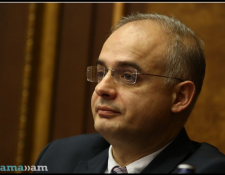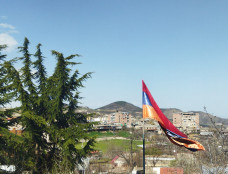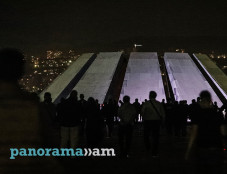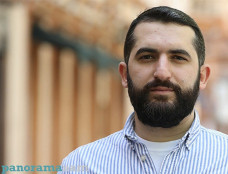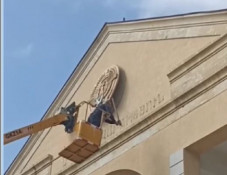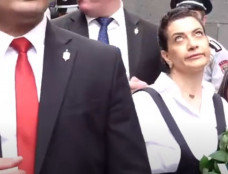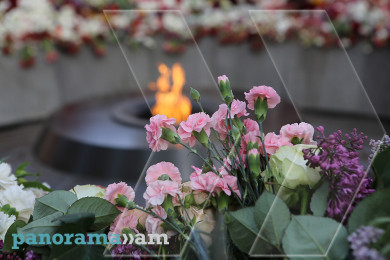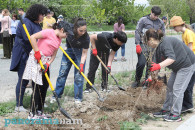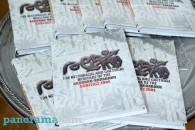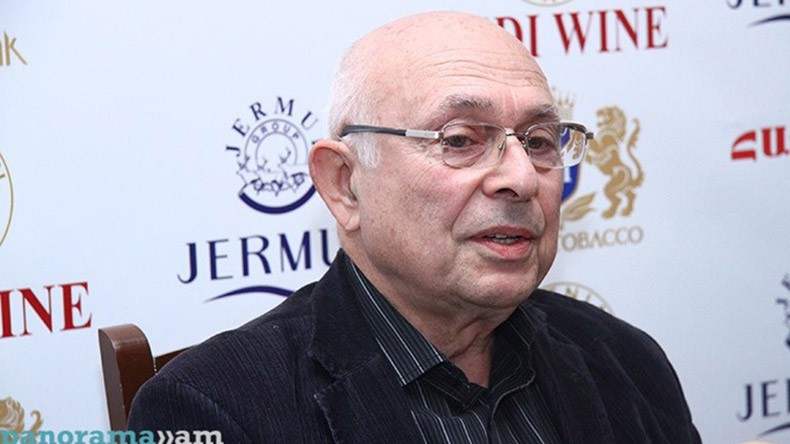
Rouben Galichian: Azari is Iranian dialect, Turkic language was introduced in region of in C11 with nomad Oghuzes
Up to the middle ages, the spoken language and its dialects in Iranian Azerbaijan (Atropatene) had a common name, Azari or Azerbaijani, but not Turkic, according to Persian and Atropatene historians and linguists, famous cartographer Rouben Galichian writes in his book Historical and Geographical Falsifications of Azerbaijan, a historical, cultural and cartographical research based on a detailed analysis backed by documentary evidence.
In his study The Ancient Language of Azerbaijan, W. Henning (1908 - 1967), linguist and specialist on Iranian languages, confirms that the language Azari comprises several variants of the ancient languages of the Iranian Pahlavi language, which are now out of use and forgotten.
Galichian also references Arab historiographer and geographer Ibn Hawqal (deceased around 978 AD). In his Surath ul-Ardh (Picture of the earth), the author notes that the language in some regions of Azerbaijan and Armenia was Persian, but many also spoke Arabic. “A language resembling Armenian [Armenian dialects] is spoken in different regions of Armenia, including Nakhijevan and Dvin. Three languages, Arabic, Armenian and Persian, are spoken in Khlat [an Armenian town],” Ibn Hawqal writes as cited by Galichian. He points out that Ibn Hawqal never mentions the Turkic language in any of his writings as the language was not still present in the region by then.
Persian geographer and historian Hamd-Allah Mustawfi Qazwini (1241-1349) confirms this thesis in his Nuzhat ul Qulub (Delight of Hearts). In his description of the town Maragha, he writes that ‘the local population is white, belongs to one Islamic righteous religion and speaks a variant of the Pahlavi language.’
In his study Tati and Harzani: two dialects of the ancient language of Azerbaijan, Persian linguist Abdol-Ali Karang writes that the spoken language in Azerbaijan (Atrpatakan) was earlier referred to as Azari. Comparing it with the Armenians from Nor Jugha (New Julfa, – ed.), he writes the following:
“As Armenian is a written and developed language, it remains a living and usable language thanks to its publications and literature. In contrast, the ancient dialects of Atrpatakan, called with the common name Azari and belonging to the Aryan language family, which had no literary and scientific basis and literature, gradually underwent changes and were eventually forgotten joining to the ranks of the dead languages like many other dialects.”
According to Galichian, ‘the ancient language of Atrpatakan (Atropatene),’ referred to as Azari by the Western linguists, was considered to be an altered and developed variant of the Median language, which had medieval Aryan roots. In particular, some dialects of the genuine Azari language are still in use in some villages and districts of Atrpatakan. Tati is spoken in Karingan, Arzin, Kilasur, Margar, Dizmar and other Atrpatakani villages, lying from the north of Tabriz to the river Araks. The Harzani language is spoken west of these villages, in the village of Gelin Ghiye. Both of these languages are dialects of the old Azari.
The Ottoman historian Munajjim Bashi (17th century) wrote about the tenth-eleventh century Shaddadis in one of the sections of his History of Shirvan and Daghestan, translated by the famous orientalist Vladimir Minorsky. According to Munajjim Bashi, the original sedentary population of [Iranian] Atrpatakan consisted of peasants at the time of the Arab conquest and spoke a number of dialects (Azari, Talishi) whose remnants are still preserved in some isolated Turkic-speaking communities.
“Richard Frye and Patrick Jackson, two American specialists in Iranian languages, confirm that Azari was one of the Iranian dialects. More recently, Professor Garnik Asatryan, the director of the Centre of Iranology at Yerevan State University, also wrote an article examining the ancient language of the Iranian Azerbaijan, which is considered extinct today,” Galichian writes.
Even Nicholas Awde and Fred James Hill, supporters of the theory of ‘Southern’ and ‘Northern’ Azerbaijan, write the following in their study The Azerbaijanis, “Adding to the dynamism of Azerbaijan’s past are the countless nomadic peoples and warlike tribes that took advantage of the busy migratory route from the northern steppes that ran southwards along the western shores of the Caspian down into Iran. Such a past is reflected in the present-day inhabitants of the Republic of Azerbaijan, who are themselves descendants of the various Turkic, Iranian and Caucasian peoples that have inhabited the region.”
As for the arrival of the Turkic language in the region, Galichian cites Professor Touraj Atabaki, a historian and sociologist, Senior Researcher at the International Institute of Social History in Amsterdam and the chair of the Social History of the Middle East and Central Asia at Leiden University, who was born in Iranian Azerbaijan. Atabaki writes that the Turkic language entered the region of Azerbaijan in the eleventh century as a result of the great migration of Oghuzes into Asia Minor.
“The leading tribe of the Oghuz Turks belonged to so-called tribal group ‘Iraqi Turkmen,’ poisoned and exiled from Khorasan by the Persian Qaznavi kings. Their leader Arsalan bin Seljuq was arrested and died in prison in 1034. The first group of Oghuz consisting of about 2,000 tents arrived in 1029 and they were received by Vahsudan, who used the newcomers against his enemies and conquered Artchesh with their help.”
As for the newly arrived Oghuzes’ language, which belonged to the south-eastern group of the Turkic languages, he writes that that language had some influence on the one spoken here before the Turkic conquers. However, the new language, being the everyday language of the ruling class, gradually replaced the local one.
According to the Tabriz-born historian Ahmad Kasravi (1890-1946), the Turkic language rooted in Atrpatakan and pushed Azari out of use prior to the reign of the Safavids.
“The proof of this were the Safavids themselves, who being native Atrpatakanis had already began to use the Turkish language as a replacement for the Azari, and it was only the founding father of the family, Sheikh Sefi, who wrote poetry in Azari, of which a few samples have reached us. When Shah Ismail established the Safavid dynasty, Turkic was already their official language,” Kasravi writes as cited by Galichian.
To be continued.
Born in Tabriz, Rouben Galichian is a descendant of refugees from Van who survived the Genocide. He received scholarship and studied engineering at Aston University, Birmingham (UK). Since in 1981, he started to study the rich cartographical heritage in the libraries of the UK and other European countries. His first research, Historic Maps of Armenia (in English), was published in 2004. It was a collection of maps from various libraries and museums in the world, where Armenia was noted, beginning from the 6th century to the present times. His second book, Armenia in World Cartography, was published in Yerevan in 2005. The research ‘Countries South of the Caucasus in Medieval Maps. Armenia, Georgia and Azerbaijan’ (in English and Armenian) was published in 2007. The book The Invention of History (in English) was published in 2009.
In his book Historical and Geographical Falsifications of Azerbaijan, published in 2013, the author details the reasons, aims and methodology of the falsification of the history of Azerbaijan and the countries of the region.
Related news
- Rouben Galichian: For Azerbaijani historians, issues of their people’s origin are flexible and alterable theories
- Rouben Galichian: Ziya Buniatov played key role in setting ground for conducting anti-Armenian propaganda in Azerbaijan
- Rouben Galichian: Falsification of Azerbaijan’s history begins from school textbooks and youth believes in that lie
- Historical and Geographical Falsifications of Azerbaijan. Rouben Galichian argues on aims of appropriating others’ history
Newsfeed
Videos





